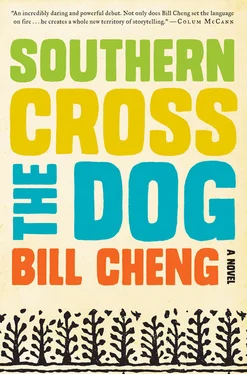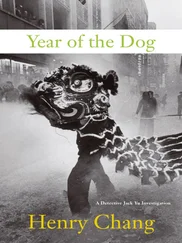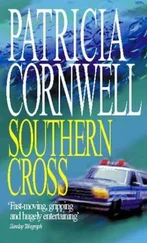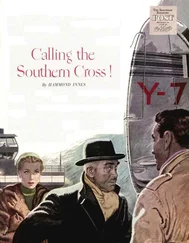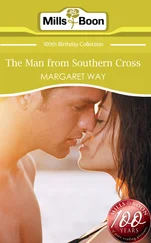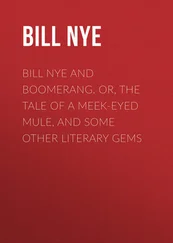He’d have me meet him at the porch, where he’d upturn his sack and the day’s find would come clattering onto the floor. Most days there wouldn’t be much in the haul — brass pots, teakettles, maybe a spoon or a knife. They’d be caked over with mud, and I’d have to take them out to the pump and scrub them clean. One time, he brought back a pair of boots.
The leather was worn and cracked, and a hole had been worn through the toe.
I looked at them like they were the first boots I’d ever seen. I held them up by their laces and let them hang in the air.
Try them on, he said.
The boots were a little big and the insides were damp and cold. He had me lace up and walk them around the yard. If I wasn’t careful, the boots would ride low about to my ankles and slip off.
How do they wear? he asked.
I looked down and wiggled my toes. They’d do just fine.
Do you like them?
I said I did.
He stared at me. His bottom lip shook a little.
How much do you like them?
He took my face in his hand, like an apple, and bit my lip. Then there was a thing in my mouth that was his tongue except it tasted all like brass. He stood up and put on his hat. His eyes were all wet and he wouldn’t look at anything except straight ahead.
Filthy, he said.

YOU LEARN WHERE TO STAND and how. Ten paces from this bush, an arm’s length from that tree. You learn how to walk — swinging your legs saddle wide, then easing your weight across a width of earth. It goes up the calves, the fat of the leg, then across. All your weight is in your belly. Then the other leg. The ball of your foot. Back into the earth. The first time, I near sunk clean through. The ground was too soft, and the mud rose up into my boots. It drew in my feet, my ankles, up above the knee. I had to dig my way out with my hands, pressing into the cold yolky soil, pulling it back in clumps.
You learn to read the mud. Where the gators drag-belly downslope. The little trough of raised slime. You learn the stink. Where the swamp wants to fold you into itself.

HIS BOOTS WERE EASY. HE left them by the door for me to clean. I took a sharp piece of tin from a coffee lid and cut out a square from the heel. No one would notice if they weren’t looking. At night I squeezed the rubber chunk in my palm. I liked to think of the small square of mud he’d track behind him when he went out. It gave me something to look for in the day.

I DID THE MIRRORS ONE at a time, going in a ring away from the house, spiraling out to where the swamp met the floodwaters. The bits of mirror were nailed up just high enough for my reach. I learned to do it in one stroke, my thumb and forefinger buttered with mud. You press down only a little so the mud’ll stick after it dries. On a good day I could black the mirrors off eight or nine trees before having to head back to the house.

HE WHUPPED ME, OF COURSE. When the house wasn’t cleaned right. If the porch wasn’t swept. The first time I left my boots out by the door. He’d tripped on them and broke a clay vase. He had a piece of docking rope that he’d coil around his arm, and with the lank end, he’d set it on my back or my hands or my behind. He’d call me a lazy this and a no-good that, and the wax would break off and I could feel the rough of the rope. He’d holler and yell and spit, and then after, he’d go into his room. It was always then that I thought about leaving, taking my things and running out into the swamp — gators and spooks and snakes be damned. I’d steal his boat and row like he rowed and I wouldn’t turn around till I made it all the way to Tallahassee or anywhere else.
But later he’d come out and wash my cuts with a sponge. He’d hug me and say how sorry he was. He smelled kind of funny then, like burnt paper. Then he bandaged me, very careful so it wasn’t too tight and the edges didn’t stick. Then he’d ask me to pray with him, and he’d take me to the front porch where God could see us, and we’d go down on our knees seeking forgiveness.
Except I wasn’t praying. I was looking out at the swamp. Waiting.

LATE INTO AUTUMN A FOG rolled in from riverward, welling up through the trees. Stuckey stared out the open door, his coat still half on, one arm through, the other arm free. He watched the fog move, glancing sometimes at his watch and letting out a little sigh. Finally, he put the other arm through the sleeve and checked the chamber of his pistol.
Don’t leave the house today, he said.
What about the chickens?
Not for any reason.
He slung his sack across his shoulder and closed the door behind him.
I did the darning and swept up real quick. When I figured it was time enough, I laced up my boots, threw on a cape, and set out toward the river. The trees stalked up through the gauzy air. I could taste the rot of sitting bog water in the fog — beading against my skin. Even without the path, I could feel my way through the swamp. I knew which tree was where, and how far it was to the next. I knew where the roots rose and the ground dipped then came up again or sloped down into a gator hatch.
There was hardly any sun overhead, just a boulder of bright cloud. Somewhere a squirrel scrambled up and went from branch to branch — the ice dusting down, some in my hair and some down my neck.
Pretty soon I found my tree. The mud was too packed for pasting, and already the bits of mirror looked near like jewels with the frost on them. I breathed against a piece and a shell of ice slid out into my hand. I put it in my mouth and it melted up cold and rusty.
Then Nan said, Go back.
But I tried to thaw another piece of mirror.
Go back.
And then I heard the crunch of grass that wasn’t a gator or a croc or a coyote, but a boot meeting the brush.
Had he turned back? Maybe he got to the boat and figured the fog was too thick to row through. I pressed myself against the tree and tried to figure how far I was from the river line and the house. I hadn’t been out more than twenty minutes. But then there it was again. It came in twos like the way a man walks. Crunch and crunch. The thump of heel. The toes finding the grass.
Then again, louder.
I stared out at the mist and I could see a figure take shape. The fog moved around his outline, darkening. I began to run.
I moved through the thickness back toward where I thought the cabin must’ve been. He’d heard me for sure because I heard a voice cry after me and the whipping of low vines and branches snapping. My lungs burned and the ground became uneven and strange. Trees appeared where they shouldn’t have, and the roots caught me at my boots. My cape snagged and tore and I ripped the drawline from my throat and kept running. The white air was endless; I didn’t know where I was going.
My boots got tangled up and when I fell, the ground wasn’t where it was supposed to have been. I was tumbling, crashing into a curtain of high grass. Here, the ground was cold and wet. I tried to stand, but my ankle hurt like it’d been yanked too hard and I couldn’t stay on my feet.
There was a snort and a grunt. Then I saw where I was — the trough of smooth mud, and the ebb of dirty green water. I could make out the dull gray hue of eggs behind the grass. Something dipped into the water, like a stone dropping. I scrambled up on my hands and knees, and the water burst and I could see the snap of jaws — its black rough hide racing through the churn and up the bank.
Читать дальше
